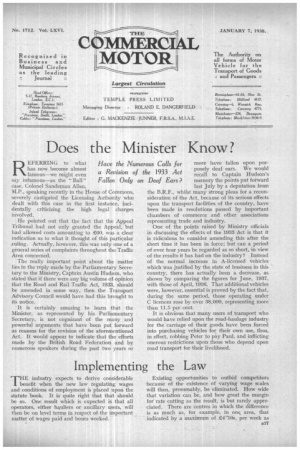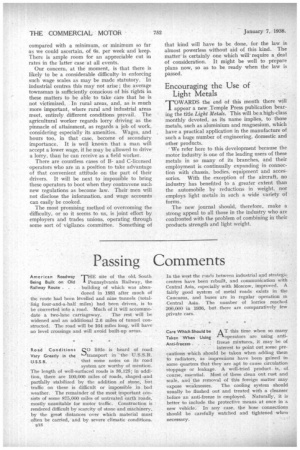Implementing the Law
Page 1

Page 2

If you've noticed an error in this article please click here to report it so we can fix it.
THE industry expects to derive considerable benefit when the new law regulating wages and conditions of employment is placed upon the statute book. It is' quite right that that should be so. One result which is expected is that all operators, either hauliers or ancillary users, will then be on level terms in respect of the important matter of wages paid and hours worked. Existing opportunities to outbid competitors because of the existence of varying wage scales will then, presumably, be eliminated. How wide that variation can be, and how great the margin for rate cutting as the result, is but rarely appreciated. There are centres in which the difference is as much as, for example, in one area, that indicated by a -maximum of £4 '10s, per week as compared with a minimum, or minimum so far as we could ascertain. of 6s. per week and keep. There is ample room for an appreciable cut in rates in the latter case at all events.
Our concern, at the moment, is that there is likely to be a considerable difficulty in enforcing such wage scales as may be made statutory. In industrial centres this may not arise ; the average townsman is sufficiently conscious of his rights in these matters to be able to take care that he is not victimized. In rural areas, and, as is much more important, where rural and industrial areas meet, entirely, different conditions prevail. The agricultural worker regards lorry driving as the pinnacle of attainment, as regards a job of work, considering especially its amenities. Wages, and hours too, in that case, become of secondary importance. It is well known that a man will accept a lower wage, if he may be allowed to drive a lorry, than he can receive as a field worker.
There are countless cases of Band C-licensed operators who are m a position to take advantage of that convenient attitude on the part of their drivers. It will be next to impossible to bring these operators to boot when they contravene such new regulations as become law. Their men will not disclose the information, and wage accounts can easily be cooked.
The most promising method of overcoming the difficulty, or so it seems to us, is joint effort by employers and trades unions, operating through some sort of vigilance. committee. Something of that kind will have to be done, for the law is almost powerless without aid of this kind. The matter is certainly one which will' require a deal of consideration. It might be well to prepare plans now, so as to be ready when the law is passed.
Encouraging the Use of Light Metals •
TOWARDS the end of this month there will appear a new Temple Press publication bearing the title Light Metals. This will be a high-class monthly devoted, as its name implies, to those metals, such as aluminium and magnesium, which have a practical application in the manufacture of such a huge number of engineering, domestic and other products.
' We refer here to this development because the motor industry is one of the leading users of these metals in so many of its branches, and their employment is continually expanding in connection with chassis, bodies, equipment and accessories. With the exception of the aircraft, no industry has benefited to a greater extent than the automobile by reductions in weight, nor employs light metals in such a wide variety of forms.
The new journal should, therefore, make a strong appeal to all those in the industry who are confronted with the problem of combining in their products strength and light weight.
































